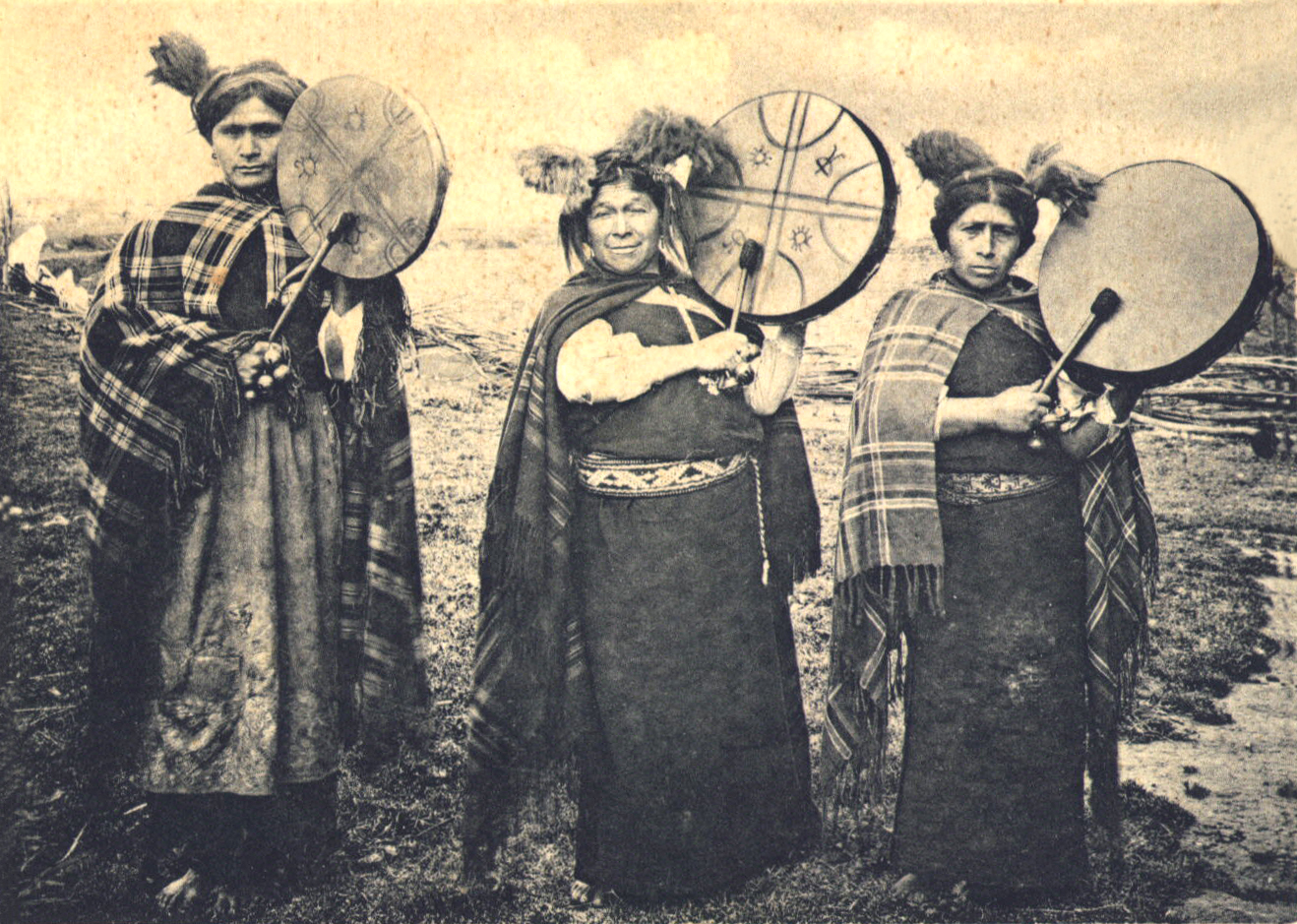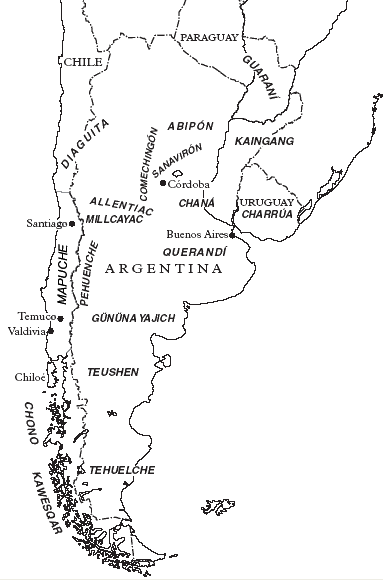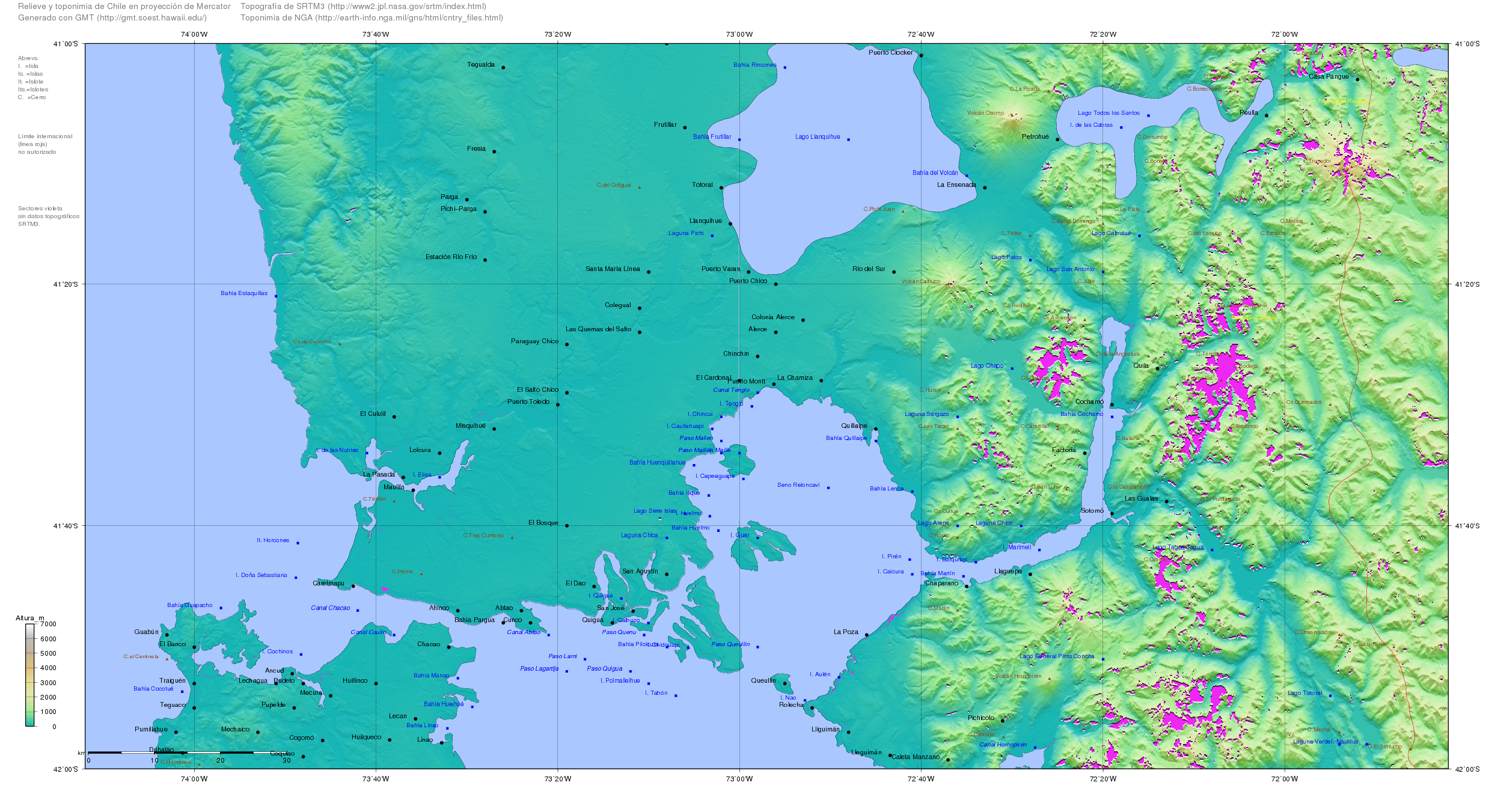|
Mapuche
The Mapuche ( (Mapuche & Spanish: )) are a group of indigenous inhabitants of south-central Chile and southwestern Argentina, including parts of Patagonia. The collective term refers to a wide-ranging ethnicity composed of various groups who shared a common social, religious, and economic structure, as well as a common linguistic heritage as Mapudungun speakers. Their habitat once extended from Aconcagua Valley to Chiloé Archipelago and later spread eastward to Puelmapu, a land comprising part of the Argentine pampa and Patagonia. Today the collective group makes up over 80% of the indigenous peoples in Chile, and about 9% of the total Chilean population. The Mapuche are particularly concentrated in the Araucanía region. Many have migrated from rural areas to the cities of Santiago and Buenos Aires for economic opportunities. The Mapuche traditional economy is based on agriculture; their traditional social organization consists of extended families, under the direction ... [...More Info...] [...Related Items...] OR: [Wikipedia] [Google] [Baidu] |
Arauco War
The Arauco War was a long-running conflict between colonial Spaniards and the Mapuche people, mostly fought in the Araucanía (historic region), Araucanía. The conflict began at first as a reaction to the Spanish conquerors attempting to establish cities and force Mapuches into encomienda, servitude. It subsequently evolved over time into phases comprising drawn-out sieges, Slave raiding, slave-hunting expeditions, pillaging raids, punitive expeditions, and renewed Spanish attempts to secure lost territories. Raptio, Abduction of women and war rape was common on both sides. After many Conquest of Chile, initial Spanish successes in penetrating Mapuche territory, the Battle of Curalaba in 1598 and the following destruction of the Seven Cities marked a turning point in the war leading to the establishment of la Frontera, Chile, a clear frontier between the Spanish domains and the land of the independent Mapuche. From the 17th to the late 18th century a series of parliaments were ... [...More Info...] [...Related Items...] OR: [Wikipedia] [Google] [Baidu] |
Mapudungun
Mapuche (, Mapuche & Spanish: , or Mapudungun; from ' 'land' and ' 'speak, speech') is an Araucanian language related to Huilliche spoken in south-central Chile and west-central Argentina by the Mapuche people (from ''mapu'' 'land' and ''che'' 'people'). It is also spelled Mapuzugun and Mapudungu. It was formerly known as Araucanian, the name given to the Mapuche by the Spaniards; the Mapuche avoid it as a remnant of Spanish colonialism. Mapudungun is not an official language of the countries Chile and Argentina, receiving virtually no government support throughout its history. However, since 2013, Mapuche, along with Spanish, has been granted the status of an official language by the local government of Galvarino, one of the many Communes of Chile. It is not used as a language of instruction in either country's educational system despite the Chilean government's commitment to provide full access to education in Mapuche areas in southern Chile. There is an ongoing politica ... [...More Info...] [...Related Items...] OR: [Wikipedia] [Google] [Baidu] |
Mapuche Language
Mapuche (, Mapuche & Spanish: , or Mapudungun; from ' 'land' and ' 'speak, speech') is an Araucanian language related to Huilliche spoken in south-central Chile and west-central Argentina by the Mapuche people (from ''mapu'' 'land' and ''che'' 'people'). It is also spelled Mapuzugun and Mapudungu. It was formerly known as Araucanian, the name given to the Mapuche by the Spaniards; the Mapuche avoid it as a remnant of Spanish colonialism. Mapudungun is not an official language of the countries Chile and Argentina, receiving virtually no government support throughout its history. However, since 2013, Mapuche, along with Spanish, has been granted the status of an official language by the local government of Galvarino, one of the many Communes of Chile. It is not used as a language of instruction in either country's educational system despite the Chilean government's commitment to provide full access to education in Mapuche areas in southern Chile. There is an ongoing politica ... [...More Info...] [...Related Items...] OR: [Wikipedia] [Google] [Baidu] |
Mapuche Religion
The mythology and religion of the indigenous Mapuche people of south-central Chile and southwestern Argentina is an extensive and ancient belief system. A series of unique legends and myths are common to the various groups that make up the Mapuche people. These myths tell of the creation of the world and the various deities and spirits that reside in it. Overview In order to describe the beliefs of the Mapuche people, it is important to note that there are no written records about their ancient legends and myths from before the Spanish arrival, since their religious beliefs were passed down orally. Their beliefs are not necessarily homogenous; among different ethnic groups, and the families, villages, and territorial groups within those ethnic groups, there are variations and differences and discrepancies in these beliefs. Likewise, it is important to understand that many of the Mapuche beliefs have been integrated into the myths and legends of Chilean folklore, and to a les ... [...More Info...] [...Related Items...] OR: [Wikipedia] [Google] [Baidu] |
Lautaro
Lautaro (Anglicized as 'Levtaru') ( arn, Lef-Traru " swift hawk") (; 1534? – April 29, 1557) was a young Mapuche toqui known for leading the indigenous resistance against Spanish conquest in Chile and developing the tactics that would continue to be employed by the Mapuche during the long-running Arauco War The Arauco War was a long-running conflict between colonial Spaniards and the Mapuche people, mostly fought in the Araucanía (historic region), Araucanía. The conflict began at first as a reaction to the Spanish conquerors attempting to estab .... Levtaru was captured by Spanish forces in his early youth, and he spent his teenage years as a personal servant of chief conquistador Pedro de Valdivia, but escaped in 1551. Back among his people he was declared toqui and led Mapuche warriors into a series of victories against the Spanish, culminating in the Battle of Tucapel in December 1553, where Pedro of Valdivia was killed. The outbreak of a typhus plague, a drough ... [...More Info...] [...Related Items...] OR: [Wikipedia] [Google] [Baidu] |
Tehuelche People
The Tehuelche people, also called the Aónikenk, are an indigenous people from eastern Patagonia in South America. In the 18th and 19th centuries the Tehuelche were influenced by Mapuche people, and many adopted a horseriding lifestyle. Once a nomadic people the lands of the Tehuelche were colonized in the 19th century by Argentina and Chile gradually disrupting their traditional economies. The establishment of large sheep farming estates in Patagonia was particularly detrimental to the Tehuelche. Contact with outsiders also brought in infectious diseases ushering deadly epidemics among Tehuelche tribes. Most existing members of the group currently reside the in cities and towns of Argentine Patagonia. The name "Tehuelche complex" has been used by researchers in a broad sense to group together indigenous peoples from Patagonia and the Pampas. Several specialists, missionaries and travelers have proposed grouping them together on account of the similarities in their cultural tra ... [...More Info...] [...Related Items...] OR: [Wikipedia] [Google] [Baidu] |
Chile
Chile, officially the Republic of Chile, is a country in the western part of South America. It is the southernmost country in the world, and the closest to Antarctica, occupying a long and narrow strip of land between the Andes to the east and the Pacific Ocean to the west. Chile covers an area of , with a population of 17.5 million as of 2017. It shares land borders with Peru to the north, Bolivia to the north-east, Argentina to the east, and the Drake Passage in the far south. Chile also controls the Pacific islands of Juan Fernández, Isla Salas y Gómez, Desventuradas, and Easter Island in Oceania. It also claims about of Antarctica under the Chilean Antarctic Territory. The country's capital and largest city is Santiago, and its national language is Spanish. Spain conquered and colonized the region in the mid-16th century, replacing Inca rule, but failing to conquer the independent Mapuche who inhabited what is now south-central Chile. In 1818, after ... [...More Info...] [...Related Items...] OR: [Wikipedia] [Google] [Baidu] |
Patagonia
Patagonia () refers to a geographical region that encompasses the southern end of South America, governed by Argentina and Chile. The region comprises the southern section of the Andes Mountains with lakes, fjords, temperate rainforests, and glaciers in the west and deserts, tablelands and steppes to the east. Patagonia is bounded by the Pacific Ocean on the west, the Atlantic Ocean to the east, and many bodies of water that connect them, such as the Strait of Magellan, the Beagle Channel, and the Drake Passage to the south. The Colorado and Barrancas rivers, which run from the Andes to the Atlantic, are commonly considered the northern limit of Argentine Patagonia. The archipelago of Tierra del Fuego is sometimes included as part of Patagonia. Most geographers and historians locate the northern limit of Chilean Patagonia at Huincul Fault, in Araucanía Region.Manuel Enrique Schilling; Richard WalterCarlson; AndrésTassara; Rommulo Vieira Conceição; Gustavo Walter B ... [...More Info...] [...Related Items...] OR: [Wikipedia] [Google] [Baidu] |
Cunco People
Cuncos or Juncos is a poorly known subgroup of Huilliche people native to coastal areas of southern Chile and the nearby inland. Mostly a historic term, Cuncos are chiefly known for their long-running conflict with the Spanish during the colonial era of Chilean history. Cuncos cultivated maize, potatoes and quinoa and raised chilihueques.Urbina 2009, p. 44. Their economy was complemented by travels during spring and summer to the coast where they gathered shellfish and hunted sea lions. They were said to live in large rukas.Alcamán 1997, p. 32. Cuncos were organized in small local chiefdoms forming a complex system intermarried families or clans with local allegiance.Alcamán 1997, p. 47. Ethnicity and identity The details of the identity of the Cuncos is not fully clear. José Bengoa defines "Cunco" as a category of indigenous Mapuche-Huilliche people in southern Chile used by the Spanish in colonial times.Bengoa 2000, p. 122. The Spanish referred to them as ''indios ... [...More Info...] [...Related Items...] OR: [Wikipedia] [Google] [Baidu] |
Indigenous Peoples Of The Americas
The Indigenous peoples of the Americas are the inhabitants of the Americas before the arrival of the European settlers in the 15th century, and the ethnic groups who now identify themselves with those peoples. Many Indigenous peoples of the Americas were traditionally hunter-gatherers and many, especially in the Amazon basin, still are, but many groups practiced aquaculture and agriculture. While some societies depended heavily on agriculture, others practiced a mix of farming, hunting, and gathering. In some regions, the Indigenous peoples created monumental architecture, large-scale organized cities, city-states, chiefdoms, State (polity), states, Realm, kingdoms, republics, Confederation, confederacies, and empires. Some had varying degrees of knowledge of engineering, architecture, mathematics, astronomy, writing, physics, medicine, planting and irrigation, geology, mining, metallurgy, sculpture, and gold smithing. Many parts of the Americas are still populated by Indigeno ... [...More Info...] [...Related Items...] OR: [Wikipedia] [Google] [Baidu] |
Huilliche
The Huilliche , Huiliche or Huilliche-Mapuche are the southern partiality of the Mapuche macroethnic group of Chile. Located in the Zona Sur, they inhabit both Futahuillimapu ("great land of the south") and, as the Cunco subgroup, the north half of Chiloé Island. The Huilliche are the principal indigenous people of those regions.Villalobos ''et al''. 1974, p. 49. According to Ricardo E. Latcham the term Huilliche started to be used in Spanish after the second founding of Valdivia in 1645, adopting the usage of the Mapuches of Araucanía for the southern Mapuche tribes. Huilliche means 'southerners' (Mapudungun ''willi'' 'south' and ''che'' 'people'.) A genetic study showed significant affinities between Huilliches and indigenous peoples east of the Andes, which suggests but does not prove a partial origin in present-day Argentina. During the 16th, 17th, and 18th centuries, the mainland Huilliche were generally successful at resisting Spanish encroachment. However, after th ... [...More Info...] [...Related Items...] OR: [Wikipedia] [Google] [Baidu] |
Chiloé Archipelago
The Chiloé Archipelago ( es, Archipiélago de Chiloé, , ) is a group of islands lying off the coast of Chile, in the Los Lagos Region. It is separated from mainland Chile by the Chacao Channel in the north, the Sea of Chiloé in the east and the Gulf of Corcovado in the southeast. All islands except the Desertores Islands form Chiloé Province. The main island is Chiloé Island. Of roughly rectangular shape, the southwestern half of this island is a wilderness of contiguous forests, wetlands and, in some places, mountains. The landscape of the northeastern sectors of Chiloé Island and the islands to the east is dominated by rolling hills, with a mosaic of pastures, forests and cultivated fields. The archipelago is known within Chile for its distinctive folklore, mythology, potatoes, cuisine and unique architecture. The culture of Chiloé is the result of mixing of Huilliche, Spanish and Chono influences in centuries of isolation without much contact with the rest o ... [...More Info...] [...Related Items...] OR: [Wikipedia] [Google] [Baidu] |







_2007.jpg)